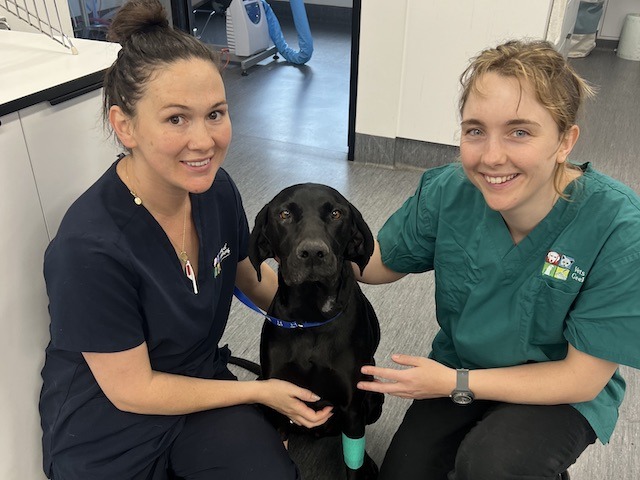Dogs with arthritis typically present to the vet with several signs and symptoms, including:
Common Signs and Symptoms of Arthritis in Dogs:
- Limping or Lameness: Intermittent or consistent limping, especially after exercise or prolonged rest.
- Stiffness: Noticeable stiffness, particularly after getting up from lying down or after rest.
- Reluctance to Move: Hesitancy or refusal to jump, climb stairs, or participate in usual activities.
- Decreased Activity: Reduced interest in walks, play, or other physical activities.
- Pain or Discomfort: Whining, yelping, or showing signs of pain when touched or moved.
- Behavioral Changes: Increased irritability, aggression, or withdrawal from interaction with family members.
Treatments for Arthritis in Dogs:
- NSAIDs (Non-Steroidal Anti-Inflammatory Drugs): Help control joint pain and inflammation but may cause gastrointestinal upset or affect kidney and liver health. A blood test is often recommended before long-term use.
- Gabapentin: Used as an analgesic to reduce pain without affecting joint inflammation. May cause sedation and sleepiness.
- Beransa: A monthly injection of a monoclonal antibody that blocks nerve growth factor to provide pain relief. Safe for use with other drugs.
- Pentosan: Improves blood flow to joints, decreases inflammation, and reduces pain. Typically involves an initial course of 4 weekly injections followed by monthly boosters.
- Tramadol: Sometimes used for pain relief, though other medications are often more effective. May cause sedation or nausea.
- Ketamine Injections: Useful for severe arthritis unresponsive to other treatments. Administered monthly at a low dose, with intervals possibly reduced as arthritis progresses.
- CBD Oil: An oral supplement that activates opioid receptors for pain relief and may reduce inflammation. Does not contain THC, the psychoactive component of marijuana.
- Stem Cells: Involves injecting donor stem cells into degenerated joints to stimulate repair. Effective in 90% of cases.
Environmental Changes:
- Ramps: Help eliminate the need for stairs or jumping into cars, beds, or couches. Non-slip mats on hard surfaces can also be beneficial.
- Sleeping and Feeding: Ensure your dog’s bed is warm, well-padded, and raised off the ground. Elevate food and water bowls to elbow height.
- Shelter and Coats: Cold weather can exacerbate arthritis, so keep pets warm, especially during winter. Provide adequate shelter or dog coats.
Surgery:
- In severe cases, surgical options like joint replacement or arthroscopy may be considered.
Preventive and Supportive Care:
- Regular Veterinary Check-Ups: Monitor the dog’s condition and adjust treatment plans as needed.
- Appropriate Exercise: Keep the dog active to maintain muscle tone and joint flexibility.
- Balanced Diet: Provide a diet tailored to the needs of senior dogs to support overall health and joint function.
Early detection and a comprehensive treatment plan can significantly improve the quality of life for dogs with arthritis.
